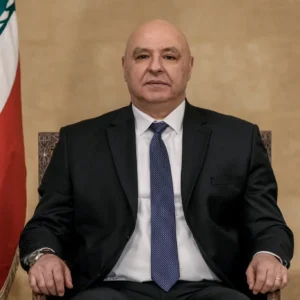Who is Joseph Aoun?
Joseph Aoun is Lebanon’s newly elected president and a former army commander. Aoun was born in 1964 in Sin el-Fil, a northern suburb of Beirut, and joined the Lebanese army in 1983 during the country’s civil war. During his service, he steadily rose through the ranks, eventually becoming the commander of the Lebanese Armed Forces in 2017. Aoun is known for his no-nonsense approach and nonpartisan stance.
How did he become president?
Aoun was elected by parliament after a presidential vacuum of more than two years. His election came after 12 failed attempts to elect a successor to former president Michel Aoun (no relation). Joseph Aoun received broad support from political figures and won 99 votes in the second round of voting. His election is seen as a result of international pressure and the military and political weakening of Hezbollah following its war with Israel.
The electoral process that led to Aoun’s election was shaped by Lebanon’s complex internal political dynamics. In the first round, Hezbollah and Amal blocs chose to abstain from voting for Aoun, casting blank ballots. After intense negotiations in the second round, they came to an agreement on key issues like government rebuilding, defense strategy, military leadership, and control of the ministry of finance. After this, both political groups shifted their positions and backed Aoun’s bid for presidency, securing the 99 votes necessary for his ascendancy to president.
What challenges does he face?
Aoun’s presidency comes at a time of significant political and economic challenges for Lebanon. The country is grappling with a severe economic crisis, widespread corruption, and the aftermath of a 14-month long conflict between Israel and Hezbollah. The Lebanese currency has collapsed. Before the conflict, the average salary of a soldier was about $800 per month, but the crash in the value of the Lebanese pound has brought that to just $100. Lebanon is also facing a captagon drug trafficking crisis, as Lebanon is one of the primary sources of captagon shipments to the Gulf. Aoun has openly criticized the country’s previous leadership for its lack of action and accountability for these issues. In addition to the currency collapse, Lebanon’s economic crisis has affected trade, investment, and migration.
What are his priorities?
In his acceptance speech, Aoun pledged to carry out judicial reforms, fight corruption, and consolidate Lebanon’s right to monopolize the carrying of weapons. Aoun’s aim to overhaul Lebanon’s judicial system is to ensure transparency, accountability, and independence, a crucial step in restoring public trust in the legal system and addressing widespread corruption. He has vowed to tackle corruption at all levels of the government by implementing strict anti-corruption measures, holding officials accountable, and promoting a culture of integrity and transparency. He is also committed to consolidating the state’s rights to monopolize the carrying of weapons. This means disarming non-state actors including Hezbollah, and ensuring that only the Lebanese Armed Forces and official security agencies are authorized to operate weapons. He also plans to strengthen Lebanon’s border control to prevent illegal smuggling, especially in relation to captagon trafficking.
What does this mean for the greater Middle East?
Aoun’s election reflects a shifting balance of power within Lebanon and the region. Hezbollah and the Amal Movement, often referred to as the Shia duo, both ended up voting for Aoun, even though they had been fiercely opposed to his candidacy in the past. The move by Hezbollah reflects a strategy to compromise its position in order to maintain some influence. Due to regional shifts and growing domestic discontent, the need for international legitimacy has constrained Hezbollah’s influence, pushing the group toward accommodation rather than confrontation.
Additional Reading:
Who is Joseph Aoun, a low-profile army chief who is now Lebanon’s president?
Lebanon Finally Elects a President
The fragile Israel-Hezbollah truce is holding so far, despite violations


